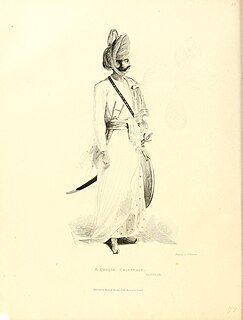Related Research Articles
Surname conventions and laws vary around the world. This article gives an overview of surnames around the world.

Tamil is a classical Dravidian language natively spoken by the Tamil people of South Asia. Tamil is an official language of the Indian state of Tamil Nadu, the sovereign nations of Sri Lanka and Singapore, and the Union Territory of Puducherry. Tamil is also spoken by significant minorities in the four other South Indian states of Kerala, Karnataka, Andhra Pradesh and Telangana, and the Union Territory of the Andaman and Nicobar Islands. It is also spoken by the Tamil diaspora found in many countries, including Malaysia, Myanmar, South Africa, United Kingdom, United States, Canada, Australia and Mauritius. Tamil is also natively spoken by Sri Lankan Moors. One of 22 scheduled languages in the Constitution of India, Tamil was the first to be classified as a classical language of India.
A patronymic, or patronym, is a component of a personal name based on the given name of one's father, grandfather (avonymic), or an earlier male ancestor.

Singh is a title, middle name or surname that means "lion" in various South Asian and Southeast Asian communities. Traditionally used by the Hindu Kshatriya community, it eventually became a common surname adopted by different communities including Rajputs and Sikhs. It was later mandated in the late 17th century by Guru Gobind Singh for all male Sikhs as well, in part as a rejection of caste-based prejudice. It has also been adopted by several castes and communities. As a surname or a middle name, it is now found throughout the world across communities and religious groups, becoming more of a title than a surname.

Eastern Slavic naming customs are the traditional way of identifying a person's given name and patronymic name in Russia and some countries formerly part of the Russian Empire or the Soviet Union.
A name suffix, in the Western English-language naming tradition, follows a person's full name and provides additional information about the person. Post-nominal letters indicate that the individual holds a position, educational degree, accreditation, office, or honor. Other examples include generational designations like "Sr." and "Jr." and "I", "II", "III", etc. Another used is Sñr.
Mudaliar is a Tamil title and surname. As title, it was historically given to high-ranking military officers and their descendants. The surname is most prevalent among Tamils from Tamil Nadu and Sri Lanka. Descendants of Tamil colonial migrants also bears variants of the name in countries such as South Africa, and else where in the Tamil diaspora.
Sikhs have a given name and one or both of a surname and a Khalsa name. The surname may be a family name or a caste name. Different castes still exist today in some aspects of Punjabi culture; similarly to the Hindu caste system, this system is based on employment.
In Tamil, honorifics governs daily speech and register of both written and spoken communication. Traditionally, Tamil has been classified into two registers viz செந்தமிழ் (Centamiḻ) meaning 'classical' or 'pure ' Tamil and கொடுந்தமிழ் (Koṭuntamiḻ) meaning 'corrupt' Tamil. A huge feature of this difference is honorifics. Tamil honorifics usually are suffixes, although prefixes are not uncommon.
Indian names are based on a variety of systems and naming conventions, which vary from region to region. Names are also influenced by religion and caste and may come from epics. India's population speaks a wide variety of languages and nearly every major religion in the world has a following in India. This variety makes for subtle, often confusing, differences in names and naming styles. Due to historical Indian cultural influences, several names across South and Southeast Asia are influenced by or adapted from Indian names or words.

The Thampis and Kochammas are the sons and daughters of the maharajahs of Travancore and their consorts belonging to Nair caste
The Nayak is a historic Indian title conferred on Sardars, who were governors of feudal states in the Middle Ages. Today it is also a surname. Nayaks are mostly Hindu and few Sikhs, who follow Hinduism and Sikhism respectively.
Dalitstan.org was a Dalit advocacy website active until mid-2006, one of 18 websites that were blocked by the Indian government following the 11 July 2006 Mumbai train bombings.

The title babu, also spelled baboo, is used in the Indian subcontinent as a sign of respect towards men. In some cultures, the term "babu" is a term of endearment for a loved one as well. The honorific "ji" is sometimes added as a suffix to create the double honorific "babuji", which in northern and eastern parts of India is a term of respect for one's father. "Babu" can also be used as a term of respect for any respected elder or man.
Gadaria or Gadariya are a community of traditionally non-elite pastoralists in India, most members of which identify as being of the Indian Dhangar community because they consider the two terms to be synonymous.Ahirs of north are also related to them.They were tradi
Byangsi is a West Himalayish language of India and Nepal. Estimates of numbers of speakers vary, but some sources say that the language is spoken by about 1,000-1,500 people, while others estimate as many as 3,300. Byangsi is from a region of high language density, that is to say that there are many languages among few people. It is the most dominant language in this region, although it is not widely known outside of its small hill district and those who speak it have difficulty classifying themselves for central government dealings.

The Koli is an Indian caste found in Rajasthan, Himachal Pradesh, Gujarat, Maharashtra, Uttar Pradesh, Haryana, Karnataka, Odisha and Jammu and Kashmir states in India. Koli is an agriculturist caste of Gujarat but in coastal areas they also work as fishermen along with agriculture. In the beginning of 20th century, the Koli caste was recognised as a Criminal Tribe under Criminal Tribes Act by British Indian government because of their anti-social activities during World War I.

The following list includes a brief about the titles of nobility or orders of chivalry used by the Marathas of India and by the Marathis/Konkanis in general.
Telugu is a Dravidian language spoken predominantly in the Indian states of Andhra Pradesh, Telangana and Yanam district of Puducherry, India. Telugu-speaking people have a different naming style from rest of India which can be confusing. The family name is a genitive case, hence stands first, which followed by personal name. This practice of placing family name first is also seen in Chinese, Koreans, Japanese and Hungarians.
The caste system in the Maldives is the social stratification system found among the ethnic groups of the island.